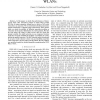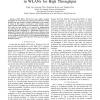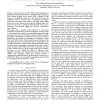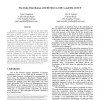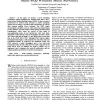WIOPT
2006
IEEE
14 years 6 months ago
2006
IEEE
Abstract— In this paper, we study the performance of clientAccess Point (AP) association policies in IEEE 802.11 based WLANs. In many scenarios, clients have a choice of APs with...
VTC
2006
IEEE
14 years 6 months ago
2006
IEEE
— IEEE 802.11 WLAN has been widely accepted throughout the world. However, it has large overhead due to idle backoff slots and frequent collisions depending on the number of node...
LCN
2006
IEEE
14 years 6 months ago
2006
IEEE
— Recent advance in IEEE 802.11 based standard has pushed the wireless bandwidth up to 600Mbps while keeping the same wireless medium access control (MAC) schemes for full backwa...
LCN
2006
IEEE
14 years 6 months ago
2006
IEEE
In wireless local area networks often a station can potentially associate with more than one access point. Therefore, a relevant question is which access point to select “best�...
IPCCC
2006
IEEE
14 years 6 months ago
2006
IEEE
A number of works have focused on the mean delay performance of IEEE 802.11 [1]. The main contribution of this paper is that it provides a method to obtain the full distribution o...
INFOCOM
2006
IEEE
14 years 6 months ago
2006
IEEE
— As the commercial success of the IEEE 802.11 protocol has made wireless infrastructure widely deployed, user organizations are increasingly concerned about the new vulnerabilit...
GLOBECOM
2006
IEEE
14 years 6 months ago
2006
IEEE
— IEEE 802.11 DCF exhibits poor scalability due to the large contention overhead. Therefore, the more the number of stations, the less the aggregate throughput. We propose a two-...
KIVS
2007
Springer
14 years 7 months ago
2007
Springer
This paper presents several results on dynamic OFDMA systems. It addresses especially the algorithmic complexity involved with several resource allocation approaches, sub-optimal h...
CIT
2007
Springer
14 years 7 months ago
2007
Springer
IEEE 802.11 based wireless LANs (WLAN) are ubiquitous nowadays. Running real time voice and video applications over LANs is becoming common place. These applications require QoS i...
VTC
2007
IEEE
14 years 7 months ago
2007
IEEE
— In the paper, we propose a novel scheduling mechanism without modifying the existing IEEE 802.11 MAC, called wireless Radio-Matching Protocol (RMP). It takes account of interfe...
